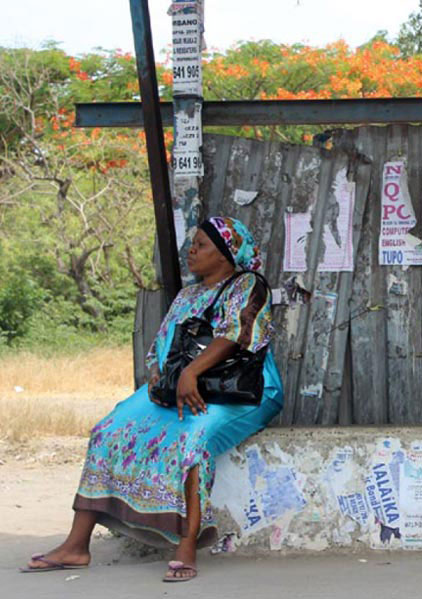LEGAL INNOVATION FOR SUSTAINABLE DEVELOPMENT & ECONOMIC OPPORTUNITY
MONGOLIA: MAKING SENSE OF MINERAL WEALTH
Having traveled the rocky path from communism to democracy, Mongolian society is mutating from semi-nomadic to industrial. The country's economy is set to be the world's fastest-growing over the next decade. A single copper and gold mine, Oyu Tolgoi, which came on line in 2013, is forecast to account for nearly a third of Mongolian GDP.
But mineral wealth has brought new inequalities. It has also tested Mongolia's capacity to negotiate complex international contracts and to distribute benefits sustainably.
IDLO has been helping build this capacity by equipping the Mongolian judiciary to handle commercial law cases at every level of the legal system.
Shareholder rights, intellectual property, insurance disputes, and insolvency and competition law were among the topics covered by the program in 2013. Participants included judges from Mongolia's Supreme Court, Appellate Court and Administrative Court, and from local provincial courts.
IDLO is also helping develop an apprenticeship program for commercial law trainers, equipping the Supreme Court Library with commercial law materials, and improving search tools for judicial decisions.
MONGOLIA HAS BEEN EXPERIENCING RAPID SOCIAL CHANGE. GLOBALIZATION MAKES IT IMPERATIVE THAT WE ACQUIRE A LEGAL FRAMEWORK FOR THESE NEW SOCIAL RELATIONS. IDLO'S TRAINING IS HELPING TO IMPROVE MY COUNTRY'S LEGAL ENVIRONMENTZorig Tsegmed, Chief Justice of Mongolia
Image: IDLO | Click to see full-size image
TAJIKISTAN'S ROAD TO REFORM
When the USSR broke up, Tajikistan was its poorest republic. To this day, economic challenges for this fragile, post-conflict nation at Afghanistan's doorstep remain acute. In 2013, IDLO intensified its partnership with Tajikistan's Judicial Training Center, progressing towards the goal of building the capacity of the entire Tajik judiciary in commercial law.
Plagued by extreme weather, Tajikistan is heavily dependent on cotton exports. It has received minimal foreign investment to date. Migrant remittances only partly alleviate the country's high poverty rates. As Tajikistan negotiates vital access to the World Trade Organization, IDLO has been building the capacity of its judges on property rights, land contract and privatization disputes, creditor rights and corporate governance.
In 2013, IDLO actively promoted international good practice among Tajik judges. We also supported the publication of judicial decisions – an important tool for reducing legal arbitrariness and corruption.
VISITING IDLO HQ AND SEEING IDLO'S WORK ON THE PROMOTION OF THE RULE OF LAW ACROSS THE WORLD, ESPECIALLY THE WORK DONE IN CENTRAL ASIA AND IN AFGHANISTAN, WAS IMPRESSIVE FOR ALL PARTICIPANTSKanoat Hamidova, Director, Judicial Training Center of Tajikistan
Image: Francesca Bocchino | Click to see full-size image
REVIVING YEMEN'S MARITIME TRADITION
After it emerged from authoritarian rule, Yemen spent much of 2013 engaged in a National Dialogue Conference. The consultation process aimed to remake the state from the ground up; it took place amid persistent security and development challenges.
Yemen is poor, with a history of factionalism and militancy. Its population is expanding fast. Success will depend on the ability to deliver economic growth, and to share its benefits fairly among competing groups.
Despite a coastal geography and seafaring past, Yemen has failed to reap the benefits of global trade. In 2013, IDLO began building capacity in the nation's commercial and maritime law sectors. Wider engagement with the Yemeni judiciary is expected in the coming year.
MARITIME LAW IS VERY IMPORTANT TO US BUT WE LACK KNOWLEDGE OF INTERNATIONAL MARITIME LAW AND CONVENTIONS. SPECIALIST TRAINING OF OUR JUDGES BY IDLO WILL HELP BOOST INVESTMENTShaher al-Salihy, Yemeni Ministry of Justice
SUSTAINABLE LAND USE IN SOUTHERN AFRICA
The fertile triangle formed by Mozambique, Tanzania and Zambia is rich in forest resources. But the three countries have struggled to reconcile the competing objectives of investment, climate resilience and conservation.
Starting in 2013, IDLO facilitated legal and institutional frameworks to prepare for climate change, and helped create incentives for low-carbon investment and sustainable land use. In partnership with the Center for International Forestry Research (CIFOR), the Organization assessed the implementation of social and environmental safeguards and devised methods of improving the sustainability of land-use sectors.
IDLO has also developed an innovative legal methodology for analyzing relevant policies, laws and institutions, as well as a review of existing investments and their challenges. The findings were presented at the UN Framework Convention on Climate Change Conference in November 2013 in Warsaw. The results of country studies and the new legal assessment methodology are being distributed to national and international actors.
THIS RESEARCH IS RELEVANT FOR THE GENERAL ZAMBIAN COMMUNITY IN STEWARDSHIP OF LAND AND OTHER LAND-BASED NATURAL RESOURCE INVESTMENTSBennett Siamwiinde Siamwiza, Dean of the School of Humanities, University of Zambia
Image: Renee Gift | Click to see full-size image
Image: Sheila McKinnon | Click to see full-size image
PRESERVING BIODIVERSITY
Biodiversity is instrumental in reducing poverty and achieving sustainable development. By contrast, the loss of habitats, crops and animal breeds threatens to negate decades of development gains, especially for some of the world's most vulnerable people. In 2010, the Nagoya Protocol called for a sea change in the relationship between those who nurture natural resources and the innovators who use these resources to develop new products. Law is at the center of the Nagoya Protocol: the text urges countries to make its provisions operable under national legislation. Legal experience and expertise must be pooled for creative solutions to emerge.
In 2013, together with the CBD Secretariat and the Centre for International ustainable Development Law (CISDL), we facilitated this sharing of knowledge and fostered dialogue to address outstanding challenges. In doing so, IDLO became a go-to forum for legal approaches to fulfilling biodiversity - or 'Aichi' - targets.
IDLO'S PROGRAM PROVIDES NEW OPPORTUNITIES TO YOUNG LAWYERS AND CONVENES THE EFFORTS OF GLOBAL EXPERTS TO MOVE FORWARD TO MEET THIS PRESSING GLOBAL CHALLENGEElisa Morgera, Sr. Lecturer in Global Environmental Law University of Edinburgh
SPOTLIGHT: PROCUREMENT AND LICENSING - THE DOS AND DON'TS
In 2013, IDLO conducted highly specialized capacity building in Public Procurement and Technology Licensing on three continents.
In Brazzaville, a two-week seminar in March trained public procurement professionals from Burudi, the Central African Republic and the host nation of Congo. Weak management in the sector has historically led to delays, poor transparency, high costs, low quality of services and misuse of resources – all significant obstacles to development in states that are highly aid-dependent.
Also in March, an IDLO public procurement course in Kuwait City focused on public-private partnerships for infrastructure development in Arab countries. Participants from a variety of Kuwaiti government bodies, public entities and state companies were exposed to international best practices, with a specific emphasis on developing and transition economies.
In November 2013, our course The Dos and Don'ts of Technology Licensing for Developing Countries brought together officials and legal professionals from 26 nations, from Angola to Vietnam. The objective of this intensive two-week course was to empower participants to better negotiate technology transfers from industrialized to developing countries, as well as intellectual property licensing agreements.
I STRONGLY BELIEVE THAT NOT ONLY FOR ME, BUT ALSO FOR ALL THE OTHER PARTICIPANTS, WHAT WE HAVE LEARNT AND SHARED DURING THE COURSE WILL BE REALLY HELPFUL AS WE WILL APPLY IT IN OUR DAILY WORK FOR THE BENEFIT OF OUR COUNTRIESNguyen Bui Khoa, Managing partner and CEO,NTK Investment – Consulting Co., Vietnam

Image: Flickr - Olli Pitkänen
PUTTING INTELLECTUAL PROPERTY TO GOOD USE
The April 1st ruling by the Supreme Court in New Delhi is national in its effect, but global in its resonance. It decisively repudiates evergreening, the practice of securing new patents for non-essential changes to existing drugs. Evergreening is the pharmaceutical equivalent of repainting your old banger to pass off as new. It must not be condoned.
All too often, developing countries fail to take advantage of the exceptions and flexibilities contained within the Agreement on Trade Related Aspects of Intellectual Property Rights (TRIPS). They lack the knowledge, resources, institutions or political will to make intellectual property laws work for their people. Many have failed to adopt the domestic legislation that would unlock TRIPS' benefits. Some are unwittingly, or under pressure, entering into regional or bilateral trade deals with extremely restrictive provisions. Their courts are too weak or subservient or corrupt to litigate health rights. Their civil society is gagged and shut out of national debates of vital consequence.
India's case is proof that the intellectual property regime, when properly applied, can work for the poor as well as the rich. The decision by the country's Supreme Court has created a giant legal footprint for others to follow. All it takes is political will, good laws, and a vigorous and independent judiciary.
Irene Khan
HUFFINGTON POST, April 2013







